In 2022, GSA’s Board of Directors launched an audit to review the five major awards conferred by the Society. Today, we are thrilled to announce the recipients of the reimagined GSA Awards, including the new Genetics Society of America Early Career Medal.
The scientists honored this year are recognized by their peers for their outstanding contributions to research and education and their distinguished service in the field of genetics. They will be presented with their awards at The Allied Genetics Conference 2024 taking place March 6-10, 2024, in Metro Washington, DC. Throughout the rest of the year, a series of profiles published in Genes to Genomes and virtual awards seminars will provide more insight into their inspiring careers.
The 2024 awardees are:
Thomas Hunt Morgan Medal
for lifetime contributions to the field of genetics
Paul Sternberg
California Institute of Technology
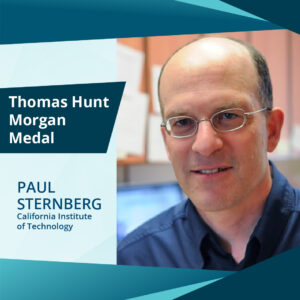
Sternberg is recognized for far-reaching contributions to the fields of genetics, developmental biology, evolution, neuroscience, and disease through the use of C. elegans as an experimental system. Sternberg is a central figure in the development of tools like WormBase, the Alliance of Genome Resources, and the Gene Ontology Consortium, as well as a founding member of microPublication Biology. This work serves as evidence of his lifelong commitment to the open sharing of data across biomedical research.
Genetics Society of America Medal
for outstanding contributions to the field of genetics
Luciano Marraffini
Rockefeller University, Howard Hughes Medical Institute
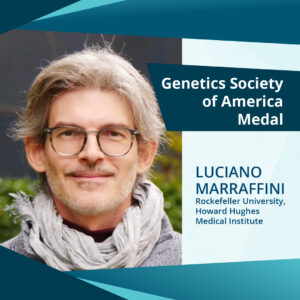
Marraffini‘s work unraveling the molecular mechanisms of the CRISPR-Cas immune response is a remarkable feat that will be long recognized as a key piece of the paradigm-shifting introduction of CRISPR-based editing into biomedical research. Additionally, Marrafini’s mentorship of PhD students and postdocs and the appreciation demonstrated by mentees speaks to an invaluable investment in the next generation of scientists—and the future of genetics research.
Genetics Society of America Early Career Medal
for outstanding contributions to the field of genetics
Ofer Rog
University of Utah
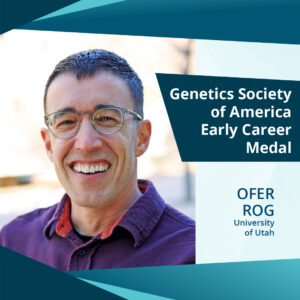
Rog is recognized for work visualizing meiotic exchange between sisters, exploring synaptonemal complex proteins, and tracking single molecules. Additionally, Rog’s efforts to recruit and maintain a diverse student body at the University of Utah and support LGBTQ+ students are commendable and an inspiration to many in the field.
Edward Novitski Prize
for extraordinary creativity and intellectual ingenuity in genetics research
Elaine Ostrander
National Human Genome Research Institute, NIH
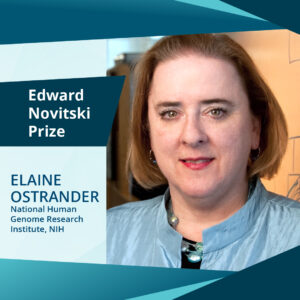
Ostrander is recognized for work developing the domestic dog as an experimental system for solving fundamental biological problems and identifying genetic sequences of relevance to human health and disease. Including work on disease and behavioral health, Ostrander has shown a dedication to creative methods for understanding canine genetics and the value of translating research organisms to human genetics.
George W. Beadle Award
for outstanding contributions to the community of genetics researchers
Deborah Andrew
Johns Hopkins University
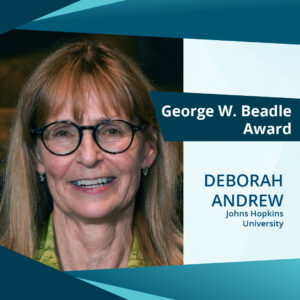
Andrew is recognized for contributions to student education at Johns Hopkins, service to the Drosophila community through the Fly Board and the Annual Drosophila Research Conference, and acting in an key role as Associate Director of Faculty Development at Johns Hopkins. Andrew’s previous and ongoing efforts to organize Drosophila researchers, teach and mentor scientists of all levels, and build a diverse and inclusive scientific enterprise are exceptional.
Elizabeth W. Jones Award
for Excellence in Education
Build-a-Genome*
Led by Jef Boeke
New York University
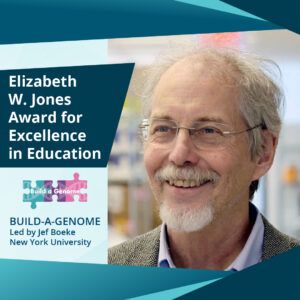
Build-a-Genome, led by Boeke, is a remarkable example of making the most of minimal resources in the service of creating meaningful and far-reaching educational opportunities. Its impact on coursetakers and facilitators is significant, and Build-a-Genome’s dissemination primarily to faculty from undergraduate institutions and underrepresented groups serves to broaden participation in genetics research—an important step as we work to build a more inclusive field.
* Build-a-Genome team members include: Jessica Dymond, In-Q-Tel; Lisa Z. Scheifele, Loyola University Maryland; Eric Cooper, Hartwick College; Robert Newman, North Carolina Agricultural and Technical State University; Franziska Sandmeier, Colorado State University, Pueblo; Yu (Jeremy) Zhao, NYU Langone Health; Stephanie Lauer, St. Thomas Aquinas College; Raquel Ordoñez, NYU Langone Health
For more information on the GSA Awards and past recipients, visit genetics-gsa.org/awards/. The Genetics Society of America serves an international community of more than 5,000 scientists who use genetics to make new discoveries and improve lives. GSA advances the field through conferences, the journals GENETICS and G3: Genes|Genomes|Genetics, advocacy, professional development programs, and more.



